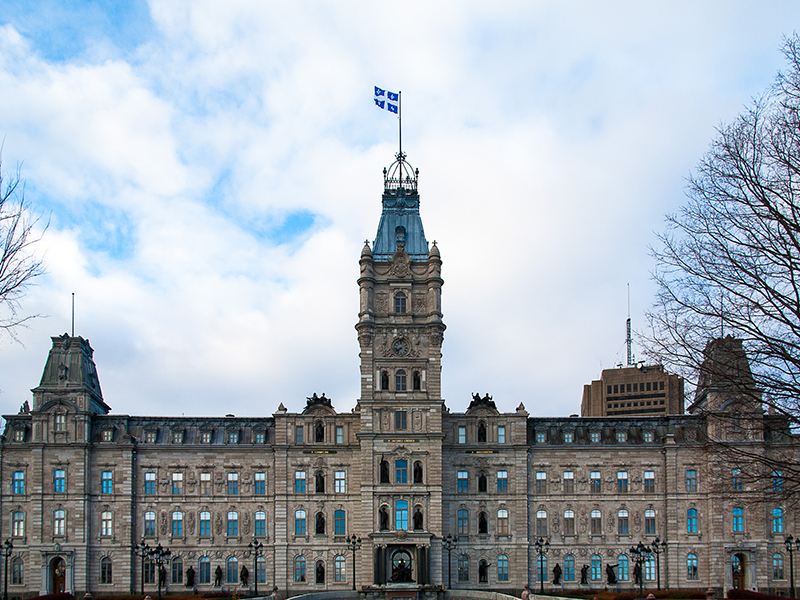Many observant Jews were unable to vote in last fall’s provincial election because advance polls were not equipped to handle the extraordinarily high number of residents in the riding of D’Arcy McGee who needed to use them, according to a complaint made to Quebec’s chief electoral officer by the D’Arcy McGee Liberal Association.
Pierre Reid, the directeur général des élections du Québec (DGEQ), had reassured the Jewish community that enough staff would be in place to accommodate the additional traffic expected because the election fell on Oct. 1, which corresponded with Shemini Atzeret, the last day of Sukkot, on which observant Jews could not cast a ballot.
This was the first time that a 2013 law fixing provincial elections every four years on the first Monday of October was put into practice. The riding association claims this contributed to the unusually low voter turnout in D’Arcy McGee.
The turnout in the riding was 47 per cent, far below its traditionally high voter participation. By comparison, in the 2014 election, it was 72 per cent. Province-wide, 66 per cent of the electorate voted in the most recent election.
The riding, which had been enlarged since the previous provincial election to include much more of the Montreal neighbourhood of Côte-des-Neiges, in addition to the towns of Côte-St-Luc and Hampstead, still has the highest number of Jewish electors, who represent 42 per cent of the population. It also has among the highest proportion of seniors in the province, the complaint notes.
The advance polls on Sept. 23 and 24 also partially conflicted with the first two days of Sukkot and were only available at a limited number of locations. Voting could take place at the returning officer’s premises on five other days before the election.
READ: SUBDUED REACTION TO ELECTION OF CAQ IN QUEBEC
The complaint stresses that the DGEQ was apprised well ahead of time about the conflict with Jewish holidays and the need to be prepared for a higher-than-normal number of people voting in advance.
D’Arcy McGee MNA David Birnbaum wrote to the DGEQ in March, and later the Centre for Israel and Jewish Affairs also expressed its concerns.
Reid’s response was that staffing would be sufficient to expedite voting in that riding and others with significant Jewish populations, namely, St-Laurent, Mont Royal-Outremont and Mercier.
That did not prove to be the case, according to the Liberal association’s complaint, which was signed by its legal counsel, Meena Khan.
“Following our examination of multiple complaints that our campaign office received, we can conclude that serious mistakes were made that led to a sharp decrease in the voter turnout rate in D’Arcy McGee, which damages the democratic process,” the complaint states.
An example offered is Sept. 23, when campaign volunteers drove 20 voters to the poll in Décarie Square. “All of these people, without exception, were seniors who had to wait long periods of time, often for over an hour, to exercise their right to vote,” states the complaint.

“When our volunteers complained about this situation, DGEQ staff responded that we ‘shouldn’t have brought in so many people.’ ”
Similar delays were recorded on four days when voting was taking place at the returning officer’s premises.
Birnbaum himself waited 75 minutes on Sept. 21 at that location, before he left.
The complaint also cites a problem at the King David Residence, a kosher seniors’ facility in Côte-St-Luc. It was the site of an advance poll, but was only open on the second day, Sept. 24, which was the first day of Sukkot, effectively disenfranchising the many observant Jewish residents there.
Reid’s written reply later in March was that the returning officers in the ridings most affected were aware of the situation and “have already planned for a sufficient amount of personnel, as well as adopted measures to assure fluidity and proper execution of the voting process during advanced voting days.”
Birnbaum reiterated the community’s concerns on Aug. 31, when he deposited his candidate’s papers at the D’Arcy McGee elections office. The response by the local director, according to the complaint, was that she was “fully aware of the file and had planned necessary measures months in advance to ensure sufficient staff would be on hand to serve electors.”
All of these people, without exception, were seniors who had to wait long periods of time, often for over an hour, to exercise their right to vote.
– D’Arcy McGee Liberal Association
Despite the repeated assurances, the riding association says it learned that the number of staff hired for the advanced voting days was based on the turnout for the 2014 provincial election. There was no conflict with a Jewish holiday then and approximately 500 voters showed up each day. The riding association says about 2,000 voters came out on the corresponding days during the 2018 election.
Even for those who were able to vote on election day itself, “unreasonable” waits were observed. For instance, at the poll in the Côte-St-Luc Aquatic and Community Centre – in “the epicentre” of the Jewish population – some electors left without voting.
Khan writes that the complaint is “in the spirit of constructive criticism, in order that the same problems are not repeated in the next election, either in our riding or elsewhere in Quebec.”
Birnbaum told The CJN that his campaign office received complaints virtually every day and “none of this should have come as a surprise.…
“These were committed people who wanted a chance to exercise their fundamental rights. It was essential that the Liberal association deliver this report, because this could, and will, happen again. It’s absolutely essential that the DGEQ fulfill its role of ensuring fair and easy access for all eligible voters. It owes us a public response.”
